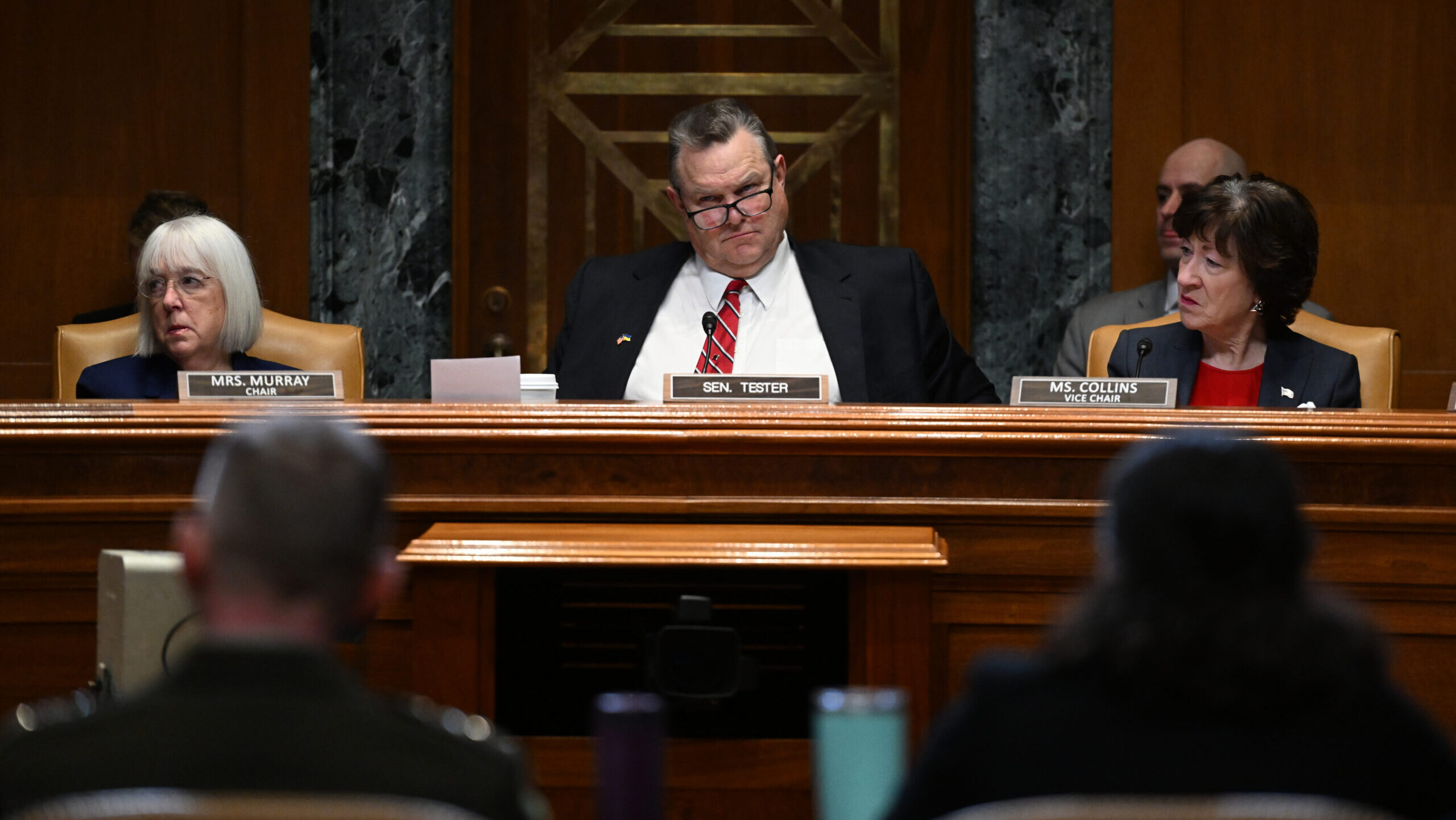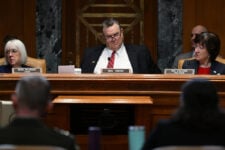
Chairman Sen. Jon Tester (D-MT), Sen. Patty Murray (D-WA), left, and Sen. Susan Collins (R-ME), right, listen to witness testimony during a Senate Appropriations – Subcommittee on Defense Hearing in 2023. (Photo by Ricky Carioti/The Washington Post via Getty Images)
WASHINGTON — The two leads of the Senate Appropriations defense subcommittee today indicated they will push for the Pentagon’s fiscal 2025 budget to eclipse the roughly $850 billion requested by the Biden administration.
Sens. Jon Tester, the Montana Democrat who chairs the subcommittee, and Susan Collins, the ranking Republican from Maine, stated that they are in lockstep that the military needs more money, despite a budget cap imposed by the Fiscal Responsibility Act.
“The ranking member Collins and myself think we need a bigger number,” Tester said in his opening statement to Defense Secretary Lloyd Austin and Chairman of the Joint Chiefs Gen. CQ Brown. “The reason for that, and you know this better than I, is that if we’re gonna invest in future technologies, this number has to be bigger.”
Stating that proposed growth is below inflation levels, the rising price of fuel and increased operations around the world, Tester stated, “We need to understand what risks this lower budget creates for our military personnel, operations round the globe and our modernization efforts.” And to get around the budget caps, “I will work with anyone to get this job done.”
Added Collins, “We must be clear eyed that this defense budget would represent a real cut for the department of defense as it fails to keep pace with inflation.”
While calls for increasing the defense budget have been de rigueur during Congressional hearings over the last month, any skirting (or breaking) of the caps will have to flow through the appropriations committees, giving Tester’s statement extra oomph.
Underscoring those comments was a statement from Sen. Patty Murray, D-Wash., the chair of the full Appropriations Committee, who also seemed to back increased defense spending — with a caveat.
“The 1 percent increase in funding provided for FY25 under the caps is as inadequate for non-defense spending as it is for the Department of Defense,” Murray said. “As members talk about how we might increase investments to better meet our defense needs, we cannot ignore our needs here at home as well.
“When it comes to additional resources above the caps, which the vice chairman and others have mentioned, I am going to insist on parity for non-defense spending, to make sure we are providing for our children and families, keeping them safe. “
For their parts, both Austin and Brown toed the party line that the budget request will not derail the administration’s broader strategy objectives, despite FRA caps.
“First, even as our budget request abides by the mandatory caps set by the Fiscal Responsibility Act, it is aligned to our strategy,” Austin said in his opening remarks. “We made tough but responsible decisions that prioritize near-term readiness, modernization of the joint force, and support for our troops and their families.”
However, Brown did acknowledge to Tester that future investments are being pushed off due to the need to stay under FRA figures. The country’s top uniformed officer said that he believes DoD can catch up on any lost momentum on those efforts, “if we are provided the resources and growth in the topline in the outyears we’ll ask for.”
Exactly how appropriators could look to work around the FRA caps is unclear. Repealing them would be one option, but unlikely to pass in the Republican-controlled House in an election year. Another would be to attempt a defense supplemental, although that may not square with Murray’s demands for parity in defense and non-defense spending.
One idea floated by Sen. Lindsay Graham, R-S.C., harkens back to a term that makes Pentagon watchdogs and budgeteers alike shiver: the creation of a new Overseas Contingency Operation (OCO) account.
“This committee ought to look at an OCO account, for shipbuilding,” Graham said, referencing the now-defunct special pot of money that was supposed to be used for the conflicts in Iraq and Afghanistan but ended up being a broader slush-fund for the Pentagon to get around budget reductions. “If you believe the Navy is essential to deterring China, then to come up with a sustainable plan to get our Navy in shape to deter war with China and other places, I think we have to look at [a] sort of modernization-OCO. I want to have a bipartisan discussion about [that idea], to give you the ships and the things you need to win the wars we hope we never have to fight by deterring them.”






















